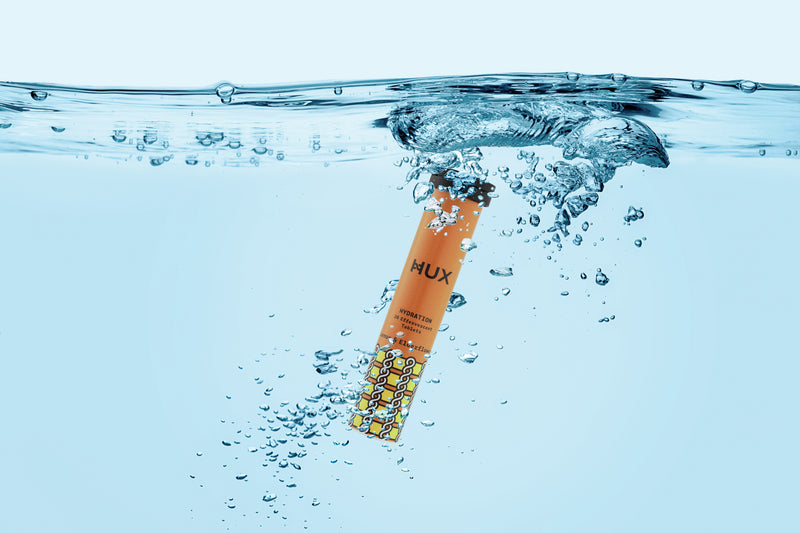Electrolytes, Coffee Myths & Greens Powders: Nutritionist Q&A with Clemmie Pellew-Harvey
We all know water is essential, but when it comes to real hydration and overall wellbeing, there’s much more to the story. To cut through the confusion, we spoke with our nutritionist, Clemmie Pellew-Harvey (DipCNM, mBANT). From the role electrolytes play in hydration, to coffee myths, greens powders, and the supplements that actually make a difference - Clemmie shares clear, practical advice you can put into action every day. Here’s her take on the most common questions we get about hydration and supplements.
Why do I need electrolytes if I already drink water?
Water is essential, but it's only part of the hydration equation. Electrolytes - sodium, potassium, magnesium, and chloride - are the minerals that actually help your body absorb and retain that water effectively. Think of water as the delivery system and electrolytes as the key that unlocks proper cellular hydration. When you sweat, exercise, or even just go about your busy day, you lose these vital minerals. Without adequate electrolytes, you can drink plenty of water but still feel dehydrated, tired, or experience headaches. This is especially important for active individuals, parents juggling busy schedules, or anyone living in warmer climates.
Does coffee dehydrate me, or is that just a myth?
This is largely a myth that needs clearing up! While caffeine has mild diuretic properties, the fluid content in your coffee more than compensates for any increased urination. Research shows that regular coffee drinkers develop tolerance to caffeine's diuretic effects, meaning your morning brew actually contributes to your daily fluid intake. However, coffee shouldn't be your only hydration source - aim for a balance of water, herbal teas, and yes, your beloved coffee. If you're drinking excessive amounts (more than 4-5 cups daily), you might notice some dehydrating effects, but moderate coffee consumption is perfectly fine for hydration.
Is there a best time of the day to take electrolytes?
Timing can enhance effectiveness! I recommend taking electrolytes first thing in the morning to kickstart hydration after hours without fluid intake, and again post-workout to replace what you've lost through sweat. If you're someone who struggles with afternoon energy dips, a midday electrolyte boost can be game-changing. For busy parents or those with demanding schedules, having electrolytes before particularly stressful or active periods helps maintain optimal performance. Listen to your body - if you're feeling sluggish, experiencing headaches, or notice decreased concentration, it might be time for an electrolyte top-up.
Why should I take a greens powder if I eat healthy?
Even with the best intentions, hitting all your nutrition targets every single day is challenging - life is busy! Greens powders act as nutritional insurance, filling potential gaps in your diet. Modern food isn't as nutrient-dense as it used to be due to soil depletion and longer transport times, meaning we often need more variety to get the same nutritional value our grandparents did. In fact, some fruits are picked prematurely, frozen for up to a year then force-ripened before being transported!! Convenience, pre-cut fruit and veg also loses nutrients through oxidisation. So a quality greens powder provides concentrated nutrients from vegetables and superfoods you might not regularly consume, plus it's incredibly convenient. Think of it as your daily safety net - supporting your healthy eating habits rather than replacing them.
Is there such a thing as "too many supplements"?
Absolutely! More isn't always better when it comes to supplements. Your body can only absorb and utilise certain amounts of nutrients, and some vitamins and minerals can actually compete for absorption or cause imbalances when taken in excess. I always recommend starting with the basics - addressing any deficiencies first, then building a targeted approach based on your individual needs, lifestyle, and health goals. Quality over quantity is key. It's better to take fewer, high-quality supplements consistently than to overwhelm your system with unnecessary additions. Always consult with a qualified nutritionist or healthcare provider to create a personalised approach.
What supplements help with stress and sleep?
Magnesium is my go-to recommendation - this mighty mineral supports over 300 enzymatic reactions in the body and acts as nature's relaxant, helping calm both mind and muscles. It's particularly effective for those who struggle with racing thoughts at bedtime. Ashwagandha is another powerhouse adaptogen that helps your body manage stress more effectively while supporting healthy cortisol levels. Other beneficial options include L-theanine for promoting calm alertness, and glycine for deeper sleep quality. Remember, supplements work best alongside good sleep hygiene practices - consistent bedtimes, limiting screens before bed, and creating a calming evening routine.
Top 3 supplements people should take daily
-
A high-quality multivitamin - Your nutritional foundation that covers the basics and fills common dietary gaps
-
Omega-3 fatty acids - Essential for brain health, heart health, and reducing inflammation, especially important if you don't eat fish regularly
-
Vitamin D3 - Crucial for immune function, bone health, and mood regulation, particularly important in the UK where sunlight exposure is limited for much of the year
These three create a solid foundation that supports overall health and wellbeing for most people, regardless of age or lifestyle.



